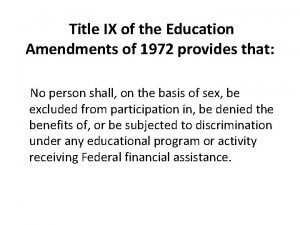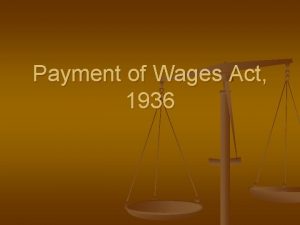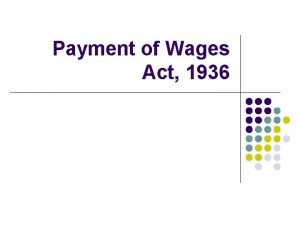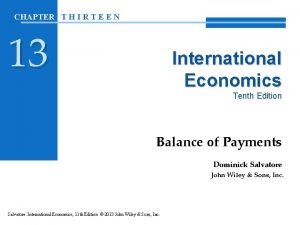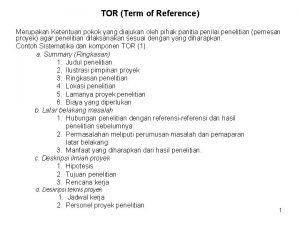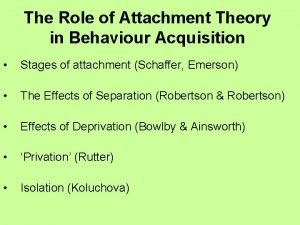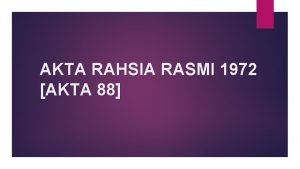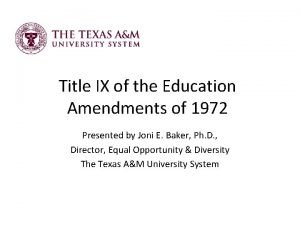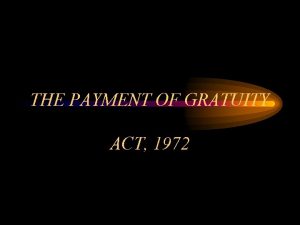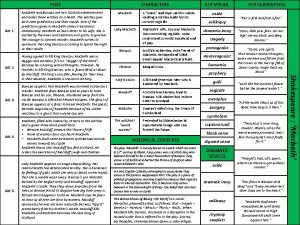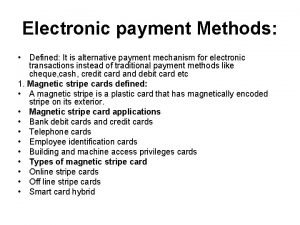INTRODUCTION The Payment of Gratuity Act 1972 is























- Slides: 23



INTRODUCTION – The Payment of Gratuity Act 1972 is a social security enactment. – An Act to provide for a scheme for the payment of gratuity to employees engaged in factories, mines, oilfields, plantations, ports, Railway companies, shops or other establishments. – The Act states that if an employee's services are terminated due to any act, wilful omission or negligence causing damage or loss to or destruction of property of the employer, the employee's gratuity shall be forfeited to the extent of damage or loss.

INTRODUCTION – Gratuity shall be payable to an employee on the termination of his employment after he has rendered continuous service for not less than five years, – (a) on his superannuation, or – (b) on his retirement or resignation, or – (c) on his death or disablement (five-year service not required) due to accident or disease

OBJECT OF PAYMENT OF GRATUITY ACT 1972 – The main object of gratuity act are to help the workman after retirement, whether retirement is a result of the rules of superannuation or physical disablement or impairment of vital part of the body. – The object of this legislation lies in the acceptance of the principle of gratuity as a compulsory statutory retirement benefit. – The object of the gratuity act compulsory payment of gratuity as a social security measure to the wage-earning population in industries, factories and establishments.

SCOPE OF PAYMENT OF GRATUITY ACT 1972 – (1) This Act may be called the Payment of Gratuity Act 1972. – (2) It extends to the whole of India. – (3) It shall come into force on such date as the Central Government may, by notification in the Official Gazette, appoint.

APPLICATION OF PAYMENT OF GRATUITY ACT 1972 – Every factory, – mine oil field, – plantation, – port or railway company – and every shop or – establishment within the meaning of any law in which ten or more persons are employed or were employed on any day of the preceding twelve months is covered by this Act.

DEFINITIONS – (a) "appropriate Government"' means, - – (i) in relation to an establishment – (a) belonging to, or under the control of, the Central Government, – (b) having branches in more than one State, – (c) of a factory belonging to, or under the control of, the Central Government, – (d) of a major port, mine, oilfield or railway company, the Central Government,

DEFINITIONS – (ii) in any other case, the State Government; – (b) "completed year of service" means continuous service for one year; [2] – (c) "continuous service" means continuous service as defined in section 2 A; ] – (d) "controlling authority" means an authority appointed by the appropriate Government under section 3 ;

DEFINITIONS – (e) "employee" means any person (other than an apprentice) employed on wages, in any establishment, factory, mine, oilfield, plantation, port, railway company or shop, to do any skilled, semi-skilled, or unskilled, manual, supervisory, technical or clerical work, whether the terms of such employment are express or implied, and whether or not such person is employed in a managerial or administrative capacity, but does not include any such person who holds a post under the Central Government or a State Government and is governed by any other Act or by any rules providing for payment of gratuity.

DEFINITIONS – (f) "employer" means, in relation to any establishment, factory, mine, oilfield, plantation, port, railway company or shop – (g) "factory" has the meaning-assigned to it in clause (m) of section 2 of the Factories Act, 1948 (63 of 1948); (h) "family", in relation to an employee, shall be deemed to consist of – (i) in the case of a male employee, himself, his wife, his children, whether married or unmarried, his dependent parents[and the dependent parents of his wife and the widow] and children of his predeceased son, if any, – (ii) in the case of a female employee, herself, her husband, her children, whether married or unmarried, her dependent parents and the dependent parents of her husband the widow and children of her predeceased son, if any:

DEFINITIONS – (i) "major port" has the meaning assigned to it in clause (8) of section 3 of the Indian Ports Act, 1908 (15 of 1908); – (j) "mine" has the meaning assigned to it in clause (J) of sub-section (1) of section 2 of the Mines Act, 1952 (35 of 1952); – (k) "notification" means a notification published in the Official Gazette; – (l) "oilfield" has the meaning assigned to it in clause (e) of section 3 of the Oilfields (Regulation and Development) Act, 1948 (53 of 1948);

DEFINITIONS – (m) "plantation" has the meaning assigned to it in clause (f) of section 2 of the Plantations Labour Act, 1951 (69 of 1951) ; – (n) "port" has the meaning assigned to it in clause (4) of section 3 of the Indian Ports Act, 1908 (15 of 1908); – (o) "prescribed" means prescribed by rules made under this Act; – (p) "railway company" has the meaning assigned to it in clause (5) of section 3 of the Indian Railways Act,

DEFINITIONS – (q) "retirement" means termination of the service of an employee otherwise than on superannuation; – (r) "superannuation", in relation to an employee, means the attainment by the employee of such age as is fixed in the contract or conditions of service at the age on the attainment of which the employee shall vacate the employment; – (s) "wages" means all emoluments which are earned by an employee while on duty or on leave in accordance with the terms and conditions of his employment and which arc paid or arc payable to him in cash and includes dearness allowance but does not include any bonus, commission, house rent allowance, overtime wages and any other allowance.

PAYMENT OF GRATUITY – Gratuity shall be paid to an employee on the termination of his employment after s/he has rendered continuous service of not less than 5 years i. e. on superannuation, retirement, resignation, death or disablement due to accident or disease (Sec 4). – The period of 5 years is not necessary if the termination of the employee is because of death or disablement. – In the case of death the amount is paid to the legal heirs.

CALCULATION OF GRATUITY – calculation of Gratuity – Gratuity is calculated at 15 days wages last drawn by the employee for each completed year of service. The monthly wage is divided by 26 and multiplied by 15. In computing a completed year of service the period in excess of six months shall be taken as a full year. Gratuity = Monthly salary x 15 days x No. of years of service.

MAXIMUM AMOUNT OF GRATUITY FOR GOVT. EMPLOYEE – For government employees, Rs 20 lakh is the maximum amount that can be paid as gratuity. – The Seventh Pay Commission had recommended increase in the gratuity ceiling to Rs 20 lakh from the earlier level of Rs 10 lakh.

MAXIMUM AMOUNT OF GRATUITY FOR GOVT. EMPLOYEE – For non-government employees covered under the Gratuity Act, the income tax exemption on any gratuity received is least of the following: – Maximum amount specified by the government which is currently Rs 10 lakh – Last drawn salary X 15/26 X years of service – Actual gratuity received

NOMINATION An employee can in the prescribed manner/form distribute the amount payable to him amongst more than one nominee, nomination being in favour of member/s of the family.

DISPUTE & RECOVERY OF GRATUITY – Dispute: In case of a dispute, the amount admitted by the employer shall be deposited with the Controlling Authority which will determine the amount payable after hearing the parties to the dispute. – Recovery of Gratuity: On the failure of employer to make the payment the Controlling Authority shall issue a certificate to collector who shall recover the amount together with compound interest @ of 9% p. a as arears of land revenue pay the amount to the person concerned.

FORFEITURE When services have been terminated for any act, wilful omission or negligence causing any damage or loss to, or destruction of property belonging to the employer, gratuity amount is forfeited to the extent of the damage or loss so caused Gratuity is forfeited fully if the services are terminated for riotous or disorderly conduct or any other act of violence or for any act which constitutes an offence involving moral turpitude provided that such offence is committed in the course of employment.

INSPECTORS – 7 A. Inspectors. -- (1) The appropriate Government may, by notification, appoint as many Inspectors, as it deems fit, for the purposes of this Act. – (2) The appropriate Government may, by general or special order, define the area to which the authority of an Inspector so appointed shall extend and where two or more Inspectors are appointed for the same area, also provide by such order, for the distribution or allocation of work to be performed by them under this Act. – (3) Every Inspector shall be deemed to be a public servant within the meaning of section 21 of the Indian Penal Code (45 of 1860). ]

 What is gratuity
What is gratuity Gratuity math definition
Gratuity math definition Forfeiture of gratuity
Forfeiture of gratuity Title xi of the education amendments of 1972
Title xi of the education amendments of 1972 Wildlife act 1972
Wildlife act 1972 Macbeth act 2 summary
Macbeth act 2 summary Scope of payment of bonus act 1965
Scope of payment of bonus act 1965 Definition of presentation
Definition of presentation Payment of wages act 1936 applicability
Payment of wages act 1936 applicability Construction act 2011 payment terms
Construction act 2011 payment terms Introduction of balance of payment
Introduction of balance of payment Introduction of balance of payment
Introduction of balance of payment The terror of war nick ut 1972
The terror of war nick ut 1972 Arti term of reference
Arti term of reference Koluchova twins
Koluchova twins Maus 1972
Maus 1972 Period of activism ( 1970-1972)
Period of activism ( 1970-1972) Yüklemleme kuramı
Yüklemleme kuramı Good and scates definition of research
Good and scates definition of research The notorious big 1972
The notorious big 1972 Darwin turvey crowder 1972
Darwin turvey crowder 1972 Contoh kes akta rahsia rasmi 1972
Contoh kes akta rahsia rasmi 1972 Title ix of the education amendments of 1972
Title ix of the education amendments of 1972 Employment guarantee scheme 1972, *
Employment guarantee scheme 1972, *



